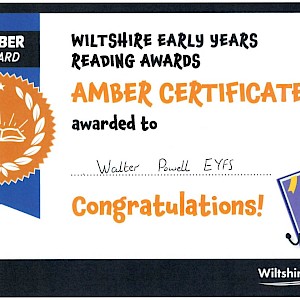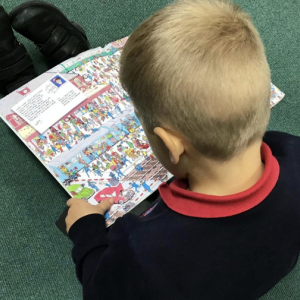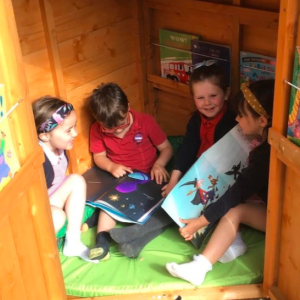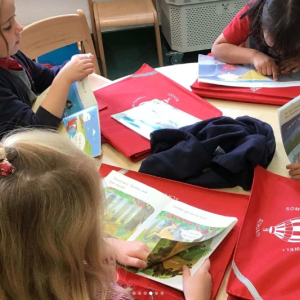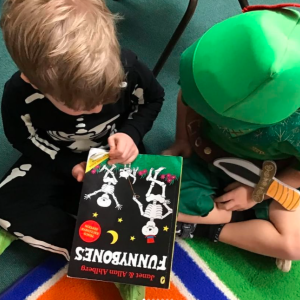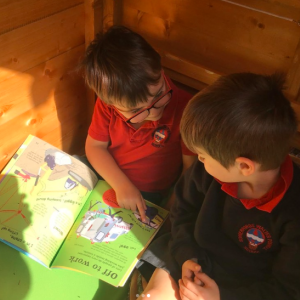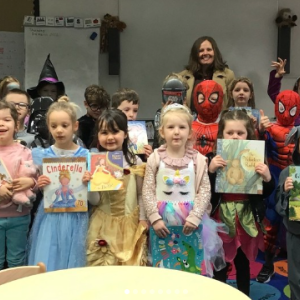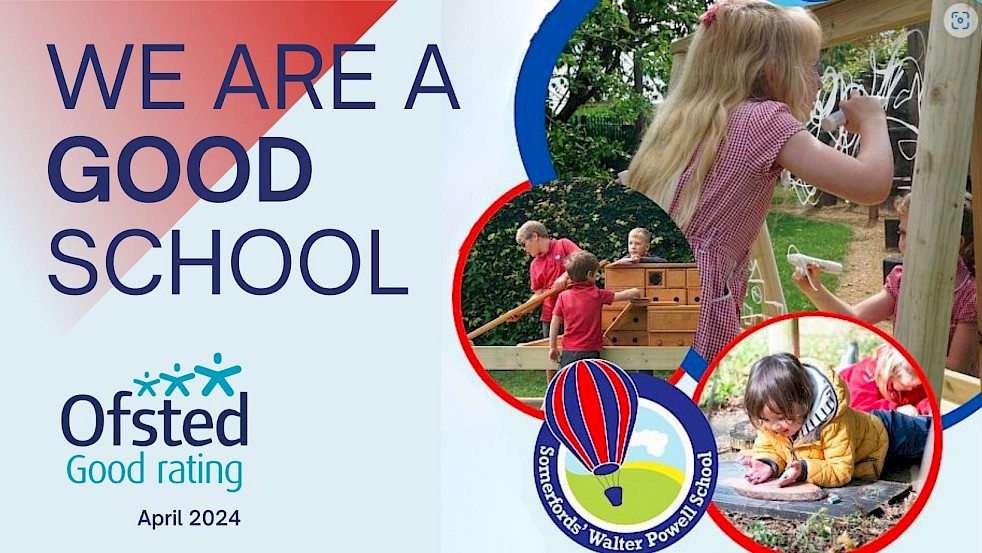Phonics and Early Reading Guidance
Phonics and early reading policy
Intent
Phonics (reading and spelling)
It is essential that our approach to teaching phonics and reading is accessible to all learners. At The Vine Schools we believe that all our children can become fluent readers and writers. This is why we teach reading through Little Wandle Letters and Sounds Revised, which is a systematic synthetic phonics programme. We start teaching Little Wandle Foundations approach in our Preschools and then, from Reception, we follow the Little Wandle Letters and Sounds Revised progression, which ensures children build on their growing knowledge of the alphabetic code, mastering phonics to read and spell as they move through school.
As a result, all our children are able to tackle any unfamiliar words as they read. At The Vine schools, we also model the application of the alphabetic code through phonics in shared reading and writing, both inside and outside of the phonics lesson and across the curriculum. We have a strong focus on language development for our children because we know that speaking and listening are crucial skills for reading and writing in all subjects.
Comprehension
At The Vine Schools, we value reading as a crucial life skill. By the time children leave us, they read confidently for meaning and regularly enjoy reading for pleasure. Our readers are equipped with the tools to tackle unfamiliar vocabulary. We encourage our children to see themselves as readers for both pleasure and purpose.
Because we believe teaching every child to read is so important, we have a Reading Leader who drives the early reading programme in our school. This person is highly skilled in teaching phonics and reading, and they monitor and support our Early years and KS1 team, so everyone teaches with fidelity to the Little Wandle Letters and Sounds Revised programme.
Implementation
Foundations for phonics in Preschool
- We provide a balance of child-led and adult-led experiences for all children that meet the curriculum expectations for ‘Communication and language’ and ‘Literacy’. These include:
- sharing high-quality stories and poems
- learning a range of nursery rhymes and action rhymes
- activities that develop focused listening and attention, including oral blending
- attention to high-quality language.
- We ensure Preschool children are well prepared to begin learning grapheme-phoneme correspondences (GPCs) and blending in Reception.
- Little Wandle Foundations is aligned to the non-statutory guidance on Development Matters and Birth to 5 Matters as well as the Early Years Foundation Stage (EYFS) statutory framework. We use it as a guide and support to our wider provision for Communication and Language, and Literacy. It supports children to:
- develop their phonological awareness, including rhyme, alliteration, syllables, initial and voice sounds, and oral blending
- love stories and rhymes, and learn by heart a bank of familiar favourites
- increase their vocabulary and confidence to talk
- improve their listening and ability to take part in back-and-forth conversations.
Language and nursery rhymes in Reception
- Research tells us that nursery rhymes can support children to develop their language, their awareness of sounds within words and even their later reading (Bryant et al. 1989).
- At the Vine schools we follow a nursery rhyme progression in the Early years and ensure that all children have daily opportunities to sing and learn rhymes.
Daily phonics lessons in Reception and KS1
- We teach phonics between 20- 30 minutes a day. In Reception, we build from 10-minute lessons, with additional daily oral blending games, to full-length lessons as quickly as possible. Session 5 allows children to review the week’s teaching and helps to consolidate learning and to help children become fluent readers.
- Children make a strong start in Reception: teaching begins at the start of the Autumn term.
- We follow the Little Wandle Letters and Sounds Revised expectations of progress:
- Children in Reception are taught to read and spell words using Phase 2 and 3 GPCs, and words with adjacent consonants (Phase 4) with fluency and accuracy.
- Children in KS1 review Phases 3 and 4 and are taught to read and spell words using Phase 5 GPCs with fluency and accuracy.
Intervention
- Any child in Reception and KS1 who need additional practice has regular intervention to support then and to close any gaps. Interventions are delivered by a fully trained adult. Interventions will continue into KS2 where a needed for individual pupils.
- Interventions follow the Little Wandle progression and use the same procedures, resources and mantras, but in smaller steps, tailored to individual need, so that every child secures their learning.
Daily phonics and spelling in Year 2
- Year 2 pupils repeat the year 1 phonics programme, to consolidate learning and are extended and challenged through extensions to sentences and independent application of spelling graphemes and words. Whole key stage teaching of phonics also enables those pupils in year 2 to address any gaps in learning.
- Pupils also have discreet spelling and grammar sessions as part of their wider English curriculum.
- Children with larger gaps in their phonic knowledge than their peers will continue to have daily phonics interventions.
Teaching reading:
- Children all have the opportunity to read in school every day. This can be 1:1 reading with an adult, group reading sessions, sharing books and stories independently and with peers in class.
- We aim to teach reading practice sessions three times a week. These:
- are taught by a fully trained adult to small groups of approximately six children
- use books matched to the children’s secure phonic knowledge using the Little Wandle Letters and Sounds Revised
- are monitored by the class teacher, who rotates and works with each group on a regular basis.
- Each reading practice session has a clear focus, so that the demands of the session do not overload the children’s working memory. The reading practice sessions have been designed to focus on three key reading skills:
- decoding: teaching children to use phonic knowledge to read words
- prosody: teaching children to read with understanding and expression
- comprehension: using dialogic talk to help children to understand the text.
- These sessions begin once children have begun to blend and are delivered according to the professional judgment of the class teacher. Where children benefit more from 1:1 reading sessions, these will continue, ensuring the above focusses are taught.
- Children in Reception will begin by reading wordless books. Once children can blend, they progress onto decodable books matched to their secure phonic knowledge.
- Where group reading is taking place, children read a group book in school three times to develop phonemic awareness, vocabulary and comprehension as well as book behaviours. Home reading books are also encouraged to be read at least three times at home and are also read in school during reading sessions.
- Children follow the big cat Collins coloured book band scheme, which is aligned with Little Wandle and progress within the scheme is recorded and monitored by the class teacher and overseen by the Reading lead. Assessment of reading is supported by the Little Wandle phonics termly assessments.
Home reading
- A decodable reading book is taken home to ensure success is shared with the family.
- Reading for pleasure books also go home for parents to share and read to children. We share the research behind the importance and impact of sharing quality children’s books with parents through parent workshops and meetings.
- We use the Little Wandle Letters and Sounds Revised parents’ resources to engage our families and share information about phonics, the benefits of sharing books, how children learn to blend and other aspects of our provision.
Additional reading support for vulnerable children
- Children in Reception and Year 1 who are receiving additional phonics Daily Keep-up sessions read their reading practice book regularly to an adult in school.
- We prioritise children who may not have reading support at home or who may not have access to books. We ensure that they have individual reading times with volunteers and staff to share quality children’s literature to promote a love of reading.
Ensuring consistency and pace of progress
- All Teachers and Teaching assistants in Reception and KS1 are trained to deliver the phonics sessions and teach reading, so we have the same expectations of progress. We all use the same language, routines and resources to teach children to read so that we lower children’s cognitive load. Additional training is given to any adult working with children in KS2 who may need it to ensure that children are receiving quality first teaching.
- Weekly content grids map each element of new learning to each day, week and term for the duration of the programme.
- Lesson templates, prompt cards and ‘How to’ videos ensure teachers all have a consistent approach and structure for each lesson.
- The Reading Lead and SLT regularly monitor and observe teaching; they use the summative data to identify children who need additional support and have gaps in learning.
- Phonics and reading are fixed on the agenda for each Early years/KS1 team meeting where assessment, focus pupils and delivery of sessions are discussed and reviewed regularly
Ensuring reading for pleasure
‘Reading for pleasure is the single most important indicator of a child’s success’ (OECD 2002).
‘The will influences the skill and vice versa’ (OECD 2010).
We highly value reading for pleasure and work hard as a school to grow our reading for pleasure pedagogy.
- We read aloud to children every day. We choose these books carefully as we want children to experience a wide range of books, including those that reflect the children at The Vine Schools and our local community as well as books that open windows into other worlds and cultures. At the Vine schools we have developed a set of core texts that is reviewed yearly. These books are progressive across the year groups and encompass a wide range.
- Every classroom has an inviting book area that encourages a love for reading. We curate these books and talk about them to entice children to read a wide range of books.
- In Nursery/Reception, children have access to the reading area every day as part of their continuous provision and the books are continually reviewed and refreshed.
- Children choose from our range of carefully chosen books to take home and share with an adult.
- As children progress through school, we take time to get to know them as readers and ensure that we engage in meaningful conversations about the books that they have read. By doing this we can recommend authors and genres of books to expand their interests.
- All children have the opportunity to visit the library bus each term.
- The school library is available for classes to use.
- Children across the school have regular opportunities to engage with a wide range of Reading for Pleasure events, such as author visits and national events.
Impact
Assessment
Assessment is used to monitor progress and to identify any child needing additional support as soon as they need it.
- Assessment for Learning (AfL) is used:
- daily within class to identify children who require further support
- to plan repeated practice throughout the day to ensure all children secure learning
- weekly in the review lesson to assess gaps, address these immediately and secure fluency of GPCs, words and spellings.
- Summative assessments are uploaded onto the Assessments tracker for Reception and Year 1. These are used:
- to generate visual reports (pupil heatmaps, pupil trends and books levels, and a summary analysis) for individual children, classes and whole year groups
- by teachers, Reading Lead and SLT who look at the data at GPC, word, tricky word and sentence level
- by SLT to scrutinise and plan how to narrow the attainment gaps between different groups of children and to put in place any additional support for teachers.
